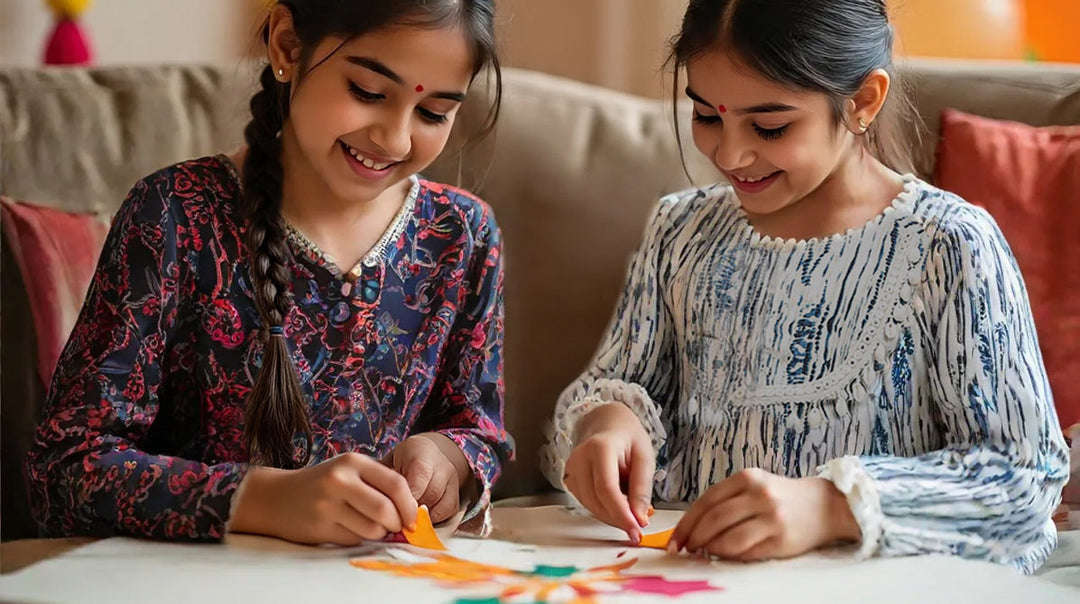Teaching Good Manners to Kids: A Step-by-Step Guide

Good habits for kids are considered universally important. While it may seem daunting to teach them good manners, if done with the right intention and approach- it’s among the best lessons a parent can impart to their child. Being likable, kind, graceful, and amiable are amazing qualities that every child can benefit from.
Importance of Good Manners for Kids
Good habits are fundamentally important. This is because there exist numerous benefits of being well-mannered. Ideally, good manners for kids should be instilled early on in childhood. A well-behaved child will be well-liked, fun-loving and have a healthy relationship with their parents, due to listening to and understanding their perspective. So, learning these habits young will set the child up for long-term success.
Teaching good manners to kids is important for their personality development. It teaches them how to be considerate and compassionate. When you treat people well, it means you respect them. Hence, good manners are foundational in building interpersonal skills, developing better relationships and in the long term, being successful academically as well as professionally. Children who are well-behaved will not feel isolated as they will feel confident. They will include themselves and others in activities, by being kind and aware of others. They will have better friendships and will be happier individuals.
Inculcating Good Manners for Kids: A Basic Foundation
While there are many building blocks of good behavior, it is always best to start with the basics. Some of these basic manners that are good and should be taught to kids include the following:
Respecting Elders
One of the most inalienable aspects of our culture is the reverence we have for our elders. This is because they are wise due to experience. By respecting them, children show them that they care for them and their opinions. Even if we might disagree with them, hearing them out and respecting their differences is crucial.
Being Honest
Honesty is the best policy- this mantra has been ingrained in us all since childhood. It is best to speak the truth, avoid lying, own up to one’s mistakes and be gracefully honest, no matter what. Children should be taught that while lying may seem convenient at the moment, it will always have consequences later on, and thus should be avoided.
Polite Greetings
Greeting people politely, such as saying “Good Morning”, “Good Afternoon” or “Good Evening” according to the time of day, saying “Namaste” to elders and casually greeting friends with a simple “Hello”, will all make social interactions more warm and inviting. Greetings are often the first thing we say when meeting someone, so saying them in the right way makes a huge difference.
Being Grateful
“Please” and “Thank You” are two words that every child must intuitively remember to say in appropriate situations. While the former helps soften one’s tone when raising a request, the latter conveys gratitude. Conveying one’s gratitude and being respectful when requesting something for oneself are both equally important.
Being Punctual and Patient
Children should learn the importance of respecting other people’s time and boundaries. This means adhering to deadlines, not being late and always being patient. Children should also become more patient and develop a tolerance for waiting. Such patience will help children become more mature, which is a significant milestone.
Sharing is Caring
Recognising one’s privilege means realizing that not everybody has what we might. Sharing with others, whether that is letting a friend borrow your objects, or donating old clothes and toys that are no longer used, is important. It instills radical empathy and encourages a capacity to think beyond one’s own needs.
Respect Privacy
Learning to respect other people’s personal space and privacy is important too. Children, who are naturally inquisitive due to their innate curiosity, may ask intrusive questions. Parents should stop that behavior and teach children to keep in mind that people have their own private lives and boundaries.
Good Table Manners
Table manners lie at the intersection of hygiene and politeness. Children should eat carefully, with appropriate cutlery, and not make a mess. They should also be respectful, making sure that they close their mouths while eating and do not finish the last piece of something before asking if somebody else wants it. They should also ask before leaving the table.
All these manners are integral. When incorporated together, they result in a child whose behavior is organized, and who is a delight to be around.
How to Teach Good Manners to Kids
While we all inherently understand the importance of good manners and habits in life, it can be tricky to find the right approach to teach them to our children. Being too strict or too lenient can be equally bad as they will both result in a child that is either too misbehaved or one that is too scared to express themselves. It is important to raise your child in a way that they are able to be polite while also being confident enough to assert themselves. It is a fine balancing act that has to be cultivated with the right approach.
Figure Out What Works For Your Family:
Manners refer simply to the behaviors that a parent wants their children to adopt. While some basic ones are commonplace, the specifics depend entirely on the parents. Some parents may want to emphasize certain aspects more. Ultimately, what works best for your family depends on your values and the child’s temperament.
Give Direct Instructions With Intention and Reasoning:
Often, parents will tell their children to do something without giving any cause. Other times, parents may be inconsistent in that they scold children for doing something that was right earlier. Children struggle with context and specificity. Explaining the reason behind something and giving direct instructions will be helpful.
Be A Role Model:
There is a lot of evidence which suggests that children learn from what they see rather than what is told to them. The best way to teach children good manners is to engage in them yourself. This will mean letting go of one’s own vices and being polite in your children’s company. For your child, you are the hero and they will model their behavior after you.
Use Praise:
When your child acts well-behaved or corrects a previously bad habit, you should praise them. Positive reinforcement creates a feedback loop. Due to this, the praise motivates the child who will remember the praise and thus repeat the behavior until it becomes a natural part of their core personality that doesn’t need to be corrected.
There Should Be Consequences For Bad Manners:
When children disobey you and act badly, there should be consequences. Ideally, these shouldn’t just be punishments that are doled out in anger or frustration. Instead, they should be related to the bad manners in question. If a child refuses to clean up their toys, their toys should be taken away for some time. If the child is rude to their friends, they should be taken home. Explaining why a punishment is exactly what it is also helps.
Be Patient With Your Child:
It takes time to develop good habits. Sometimes, children simply forget to do something due to their excitement and are unable to regulate their behavior. Giving children second chances and not expecting more than what is age-appropriate- these are both parenting techniques that will result in lasting change.
Recognise That Your Child Is Different:
Every child is different. What worked on another person’s child might not work on yours. You may even realize that your child is very different from their sibling and may need a different, uniquely tailored approach.
Thus, instilling good manners in children is essential not only for their overall development but also to set them up for future success. Children need to feel comfortable so they can freely explore and learn in a nurturing environment that encourages positive behavior. At Spunkies, we believe in the power of both quality clothing and quality upbringing. Our commitment to excellence in every stitch, dye, and embroidery mirrors the dedication needed in raising good-mannered children.
Spunkies' timeless clothing is crafted with sustainability in mind so it can last long. Our trendy clothes for kids, made from ethically sourced and premium fabrics, are meticulously crafted in-house. From design to stitching to knitting to embroidery, everything is done in-house.
So, choose Spunkies to support your child’s journey, where they can be both stylish and well-behaved and thus tackle the world with confidence and grace.





